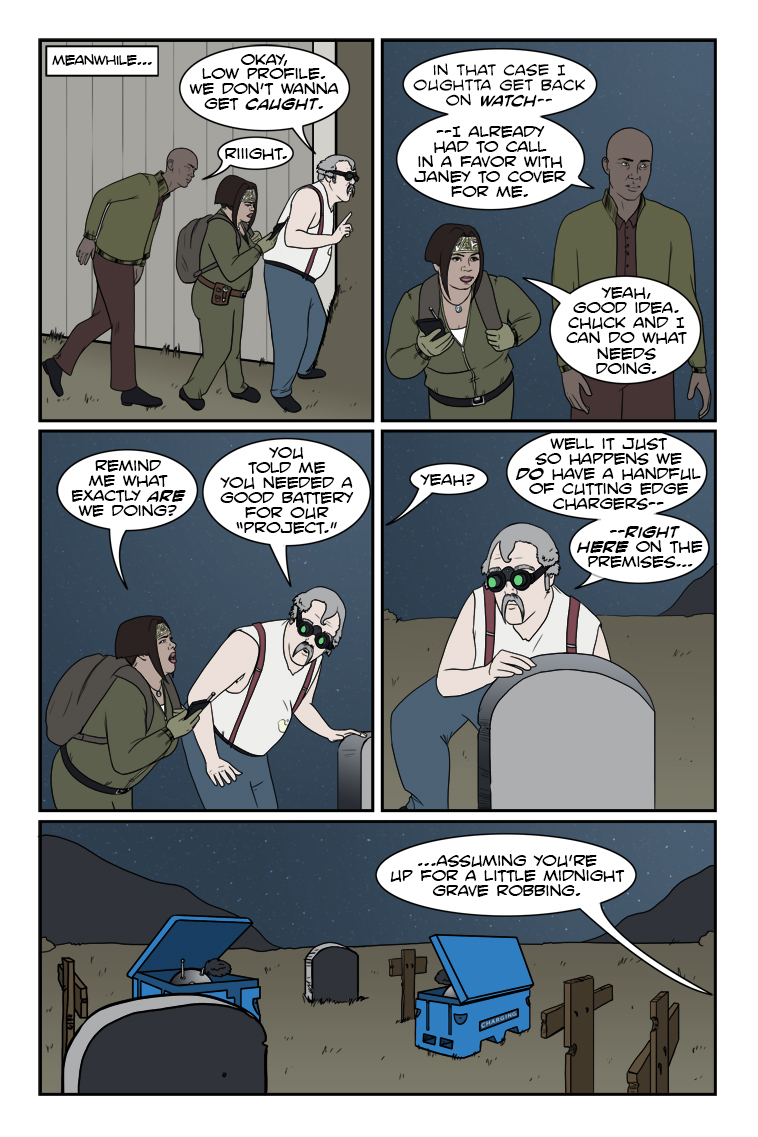Cart
Product categories
Support Us!
If you like what I do please support us on Ko-fi or Patreon.
Follow Us!
Join Our Newsletter!
Vote For Us!
Login
Polls
Events
-
Pasadena Comic Con
Dates: May 24
Location: Pasadena Convention Center, 300 E Green St, Pasadena, CA 91101, USA ( MAP)Details:We will be at the Pasadena Comic Con on January 26th. See some of you there for this one day event!
Purchase tickets online at here: https://www.tixr.com/groups/pcc/events/pasadenacomiccon-pasadena-comic-con-2025-115248
-
San Diego Comic Con: SP-N7
Dates: Jul 23 - 27
Location: San Diego Convention Center, 111 Harbor Dr, San Diego, CA 92101, USA ( MAP)Details:Clint & Dawn Wolf will be at San Diego Comic Con, as Lab Reject Studios. We will be at booth N7 in Small Press.









6 thoughts on “541 – Graverobbers”
Crazyman
“Oh, *that* kind of grave robbing? Lead on, Chuck!” 😈
Dr. Norman (not a real doctor)
What? I say “What”?
Keith
Heh, this is going to be fun. Tradition says you need to drink at least one bottle of MD 20/20 before going to the graveyard.
Honzinator
At first I was thinking of something like a potato battery … nope!
Scarsdale
If you take a dead “D” cell battery, take out the carbon rod from the center, cut a strip of galvanized sheet metal about an inch (2.7 centimeters), take a small jar for canning, suspend the rod in the center and the strip on the side, pour in drain cleaner, you’ll get 1.2 to 1.4 volts DC. 10 of those connected to an inverter will give you 120 VAC at 0.5 amps. Do NOT keep them in the same area you live in however, the fumes will burn your lungs. Just something I learned in chem class in high school. You’d have to top-up the jars every few days, however. Any type of acid will work, even salt water. I think the teacher was a survivalist…
nbaldbiz
Scheffler, Hovland and Conners Share the Lead at P.G.A. Championship
Jordan Spieth, who needs a victory at Oak Hill to complete the career Grand Slam, and Justin Thomas, who won last year’s tournament, just made the cut at five over.
Give this article
Latest Comics
#103. 99 – Event Horizon (END OF EPISODE 4)
47 Nov 16, 2011
#102. 98 – Ignorance Isn’t Bliss
43 Nov 09, 2011
#101. 97 – Dead Man’s Party
11 Nov 02, 2011
#100. 96 – By Their Deeds
14 Oct 26, 2011
#99. 95 – Nuthin’ To Sneeze At
9 Oct 19, 2011
#98. 94 – A Bit Too Nosy
13 Oct 12, 2011
#97. 93 – UHF Blues
14 Sep 28, 2011
#96. 92 – T.H.K.? T.M.I.
13 Sep 21, 2011
#95. 91 – Techs Mex
11 Sep 14, 2011
#94. 90 – Watch Your Tongue
11 Sep 07, 2011
#93. 89 – Musical Chairs
14 Aug 31, 2011
#92. 88 – Ridin’ Out
16 Aug 24, 2011
#91. 87 – From Dusk ‘Til Dawn
11 Aug 17, 2011
#90. 86 – Mentions In Passing
18 Aug 10, 2011
#89. 85 – Smoke Irritation
13 Aug 03, 2011
#88. 84 – Camerus Interruptus
16 Jul 27, 2011
#87. 83 – Fireside Chat
13 Jul 13, 2011
#86. 82 – All Pent Up
16 Jul 06, 2011
#85. 81- Hot-button Issue
21 Jun 29, 2011
#84. 80 – Pointless Points
18 Jun 22, 2011
Latest Chapters
Episode 22
Episode 21
Episode 20
Episode 19
Episode 18
Episode 17
541 – Graverobbers
WonderCon 2025 is coming soon, so the next comic is planned for April 9th.
In the meantime, relevant previousness for this week's page:
https://www.zombieranchcomic.com/comic/223-surrounded-by-film-end-of-episode-9/
https://www.zombieranchcomic.com/comic/483-solar-systems/
Host of cowpokes past…
Calendar
BlueSky Latest Posts
Writer’s Blog Archives